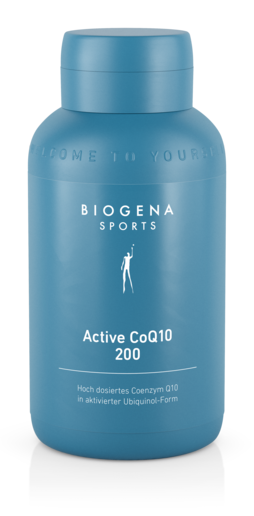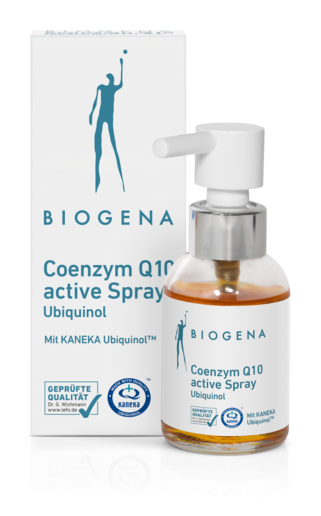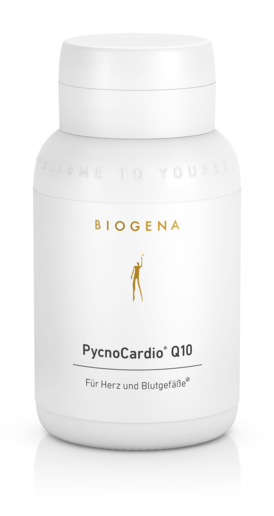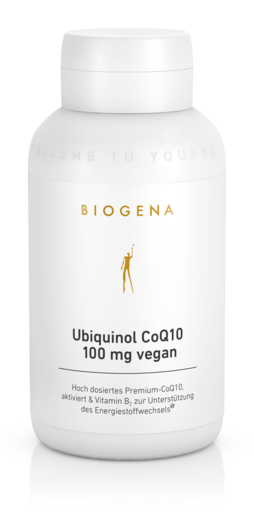Coenzyme Q10
Q10, also known as ubiquinone, is a coenzyme in the energy metabolism of cells that is produced in the body and absorbed through food. It is important for the energy balance and is often found in food supplements and cosmetics.


What is Coenzyme Q10?
A multitude of care products rely on this proven active ingredient, but selected nutritional supplements also make targeted use of it. But what is behind this rather technical term?
Coenzyme Q10 is a natural substance derived from our food that can also be produced in the body itself. In a nutshell: something natural. Coenzyme Q10 is an endogenous, vitamin-like vital substance (= vitaminoid), which is similar in chemical structure to the two fat-soluble vitamins K and E. As coenzyme Q10 is found in almost all natural organisms, it is also referred to as "ubiquinone" – derived from the word ubiquitous (Latin: prevalent everywhere). In 1978 Coenzyme Q10 earned Peter Dennis Mitchell the Nobel Prize in Chemistry for his research into its role in energy production.
Difference between enzyme and coenzyme
Enzymes are complex protein molecules that act as biocatalysts that drive many important biochemical reactions in the body. Most enzymes are very specific in their effect. When carrying out their work, so-called “coenzymes” offer them an important support function. Q10 is one of the best-known coenzymes.
Function and effect of coenzyme Q10 in the human body - its benefits
The vitamin-like substance plays a role as a kind of “ignition spark”, especially in energy production in the body's cell power plants, the mitochondria. Accordingly, high concentrations are found particularly in high-performance organs, such as the heart, but also the brain, kidneys, liver and muscles. In addition to its decisive role in energy supply, the active form of coenzyme Q10, so-called “ubiquinol”, works hand in hand with other antioxidants in the body's antioxidant network. Here, it is involved in the regeneration of vitamin E and vitamin C, among other things. Due to its role in energy metabolism and as an antioxidant, Q10 is also an important vital substance for our cardiovascular system. We humans cannot use the energy supplied through food immediately for our purposes. First, some conversion processes must take place in our body, which occurs in concentrated form in our cell power plants, the mitochondria. In the so-called “respiratory chain”, ATP (= the “energy currency” of our organism) is produced in the mitochondria, which is further released to the cells as fuel for their work processes.
Coenzyme Q10 plays a key role in this, as its supply situation determines the speed and efficacy of energy production. The active form of coenzyme Q10, ubiquinol, also called QH2, is formed under oxygen supply. Finally, it is this reduced form of Q10 that helps provide the energy to the cell. Q10 also acts as an important fat-soluble antioxidant and protects the cells from aggressive oxygen molecules, the free radicals.
What do our bodies need to form Q10? What happens in the case of a Q10 deficiency?
The amino acids L-phenylalanine, L-tyrosine, and L-methionine as building blocks, B-vitamins, and vitamin C as excipients – this is the “recipe” of the body to produce the same coenzyme Q10. The body's production of coenzyme Q10 decreases with age. The concentration in the tissues – especially in the heart muscle cells – also decreases steadily. In the course of this, performance, vitality, and energy also decrease. Pain and weakness in the muscle system and the gastrointestinal tract may also spread.
How much coenzyme Q10 do we need?
The need for coenzyme Q10 varies. People over the age of 40 in particular, those with chronic stress, athletes, users of cholesterol-lowering drugs and people on low-fat diets should pay attention to their Q10 balance.
Increased need for Q10
Bestimmte Lebenssituationen können den Bedarf an Q10 erhöhen. Dazu zählen unter anderem:
- Age
- Smoking
- taking cholesterol-lowering drugs (statins)
Which foods contain Q10?
In addition to the body's production of Q10, smaller amounts (approx. 10 mg) can also be absorbed through food. High concentrations are mainly found in certain offal (e.g. heart and liver), which are generally not or only rarely consumed in our part of the world. Small amounts are found in meat, certain fish (e.g. mackerel, sardines), soya beans, nuts, and seeds (and their oils). A special blood test can provide information about the respective supply situation. Selected dietary supplements can help with targeted Q10 intake.
Foods containing Q10 are in particular
Nuts
Fish
Meat
Seeds and cores
Potatoes
Cabbage varieties such as broccoli
Difference between coenzyme Q10, Ubquinol and ubiquinone
In our body, coenzyme Q10 exists in two manifestations: as ubiquinone and as ubiquinol. The latter is the active form and gets to work immediately and effectively. Ubiquinone, on the other hand, must first be converted into the active form of ubiquinol via several enzymatic steps – a process that is influenced by the selenium and zinc status and can be limited with increasing age or in certain diseases. A study with two Q10 preparations was also able to show that ubiquinol has a greatly improved absorption rate compared to ubiquinone.
Too little Q10 or too much Q10?
Overall, there is still no uniform scientific picture for treatment with the coenzyme. This also has to do with the fact that the Q10 supply via the general physical energy status can sometimes have a very individual effect on the well-being of people. The improved state of health is not always immediately scientifically tangible, even if users report it.
There is no known information on a possible overdose of Q10. There have been isolated reports of mild sleep disorders, lower blood sugar levels, and a decrease in efficacy with statins. However, studies have also not shown any noticeable side effects at doses between 1,200 and 3,000 mg per day. Further research is required here.
It is extremely difficult to evaluate the care of individual people with Q10. Many factors and the presence of other micronutrients and macronutrients play a role in the body's production. It is hardly possible to routinely check the supply of each organ with Q10.
Coenzyme Q10 values
Coenzyme Q10 levels are traditionally determined in blood serum. However, so-called "whole blood analysis" is considered to be more effective, as this measures all blood elements and thus the blood cells in which the vitamin is localised to a considerable extent.
In addition, it is now known how coenzyme Q10 levels are influenced by cholesterol levels. High cholesterol levels are therefore automatically associated with higher Q10 levels, which can mask a deficiency under certain circumstances. In order to prevent any possible misinterpretation, the determination of cholesterol-adjusted coenzyme Q10 is considered by experts to be the primary measurement method.
|
Parameters |
Substrate |
Reference values |
|
Coenzyme Q10 |
Blood (EDTA*) |
Deficiency < 0.67 mg/l Preventive: |
|
Coenzyme Q10 (cholesterol adjusted) |
Blood (serum) |
preventive: > 0.200 µmol/mmol cholesterol |
Table: Laboratory diagnostics - coenzyme Q10 values at a glance
*EDTA is a special acid that is added to the blood sample to prevent clotting.
Scientific news:
The BIOGENA Good Health Study* shows: A good intake of Q10 cannot be assumed automatically.
As a fat-soluble antioxidant and robust generator of energy, coenzyme Q10 is without question a vital substance that has the character of a vitamin (= vitaminoid). However, the reason why it has not been recognised as a vitamin is due to the fact that we can not only obtain Q10 through our diet, but also produce it in our own bodies. According to the BIOGENA Good Health Study, however, neither way in which we obtain Q10 guarantees healthy coenzyme Q10 levels. For example, the cholesterol-adjusted values were below the normal range in more than a quarter (26%) of the participants – an indication of insufficient Q10 intake.
Intake & dosage
Premium coenzyme Q10 supplements are a welcome way of providing the body with more Q10. But what needs to be considered when taking these supplements and in terms of dosage?
When should you take coenzyme Q10?
In principle, coenzyme Q10 can be taken at any time of day. In rare cases, however, the consumption of higher doses in the evening can lead to sleep problems. Users who experience this side effect should consider taking Q10 at an earlier time.
To improve the absorption of the fat-soluble vitamin, coenzyme Q10 supplements should always be taken together with a meal containing fat. Exceptions are preparations that already contain a fat component (e.g. ubiquinol spray).
Daily requirement: how much coenzyme Q10 should I take per day?
How much coenzyme Q10 should be taken daily depends on an individual's starting point and the reason for taking it. People in middle age who want to take coenzyme Q10 for preventive reasons are generally well advised to take 30 mg ubiquinol.
People who feel that they need more coenzyme Q10 due to their life situation (e.g. competitive sport, statin intake) or who have even been diagnosed with low Q10 levels should consult their healthcare professional regarding dosages. The dosage recommendations selected are usually derived from studies and in most cases (depending on the area of application) are between 100 – 500 mg ubiquinone or 60 – 120 ubiquinol daily.
When is high-dose coenzyme Q10 advisable?
In certain cases, taking high doses of coenzyme Q10 can be useful. This includes, for example, targeted use for migraine prophylaxis, but also to support fertility therapies or in sports nutrition. A doctor specialising in micronutrients will be happy to advise you.
Q10 as a dietary supplement
If you are looking to purchase a dietary supplement with coenzyme Q10, you can either choose a ubiquinone product or a preparation containing the "ready-to-go" form of ubiquinol. Although the latter is generally somewhat more expensive, it is also more effective. This means that the Q10 active form of ubiquinol is readily available to the body immediately. There are also studies that show that ubiquinol is better absorbed into the blood.
Which preparations should I use and when?
In addition to the compound (ubiquinone vs. ubiquinol), coenzyme Q10 supplements also differ in their form of application. Whether you choose a liquid preparation or prefer to take capsules or tablets is primarily a question of personal taste.
Liquid coenzyme Q10 preparations: Coenzyme Q10 sprays or drops can be beneficial to the body as the fat-soluble vitaminoid is already dissolved in an oil-based substance and can therefore be easily absorbed by the body. For the person using it, this means that the liquid preparation can be taken at any time – even outside of mealtimes. In addition, some people find the application of sprays or drops more pleasant. Less favourable is the often shorter shelf life of these products compared to tablets or capsules.
Coenzyme Q10 capsules or tablets: Coenzyme Q10 capsules or tablets are hygienic to use and have a relatively long shelf life. As ubiquinol is a sensitive substance, many manufacturers use additives to keep the product stable. With Kaneka UbiquinolTM, a patented and particularly stable premium raw material, BIOGENA prefers to focus on quality and uses a stable powder raw material or specialised airtight encapsulation as protection against oxidation for liquid capsules.
Buy premium Coenzyme Q10 products from BIOGENA
The market is flooded with Coenzyme Q10 products - and then there are the premium Q10 supplements from BIOGENA, the undisputed expert in micronutrients. BIOGENA offers a premium coenzyme Q10 selection that is available both in our flagship stores and in our online shop. Regardless of whether you are looking for Coenzyme Q10 in liquid or capsule form, the active ingredient content should be low or concentrated - the BIOGENA full range has the right preparation for many different needs.
Common to the entire BIOGENA Q10 range is its uncompromising quality. This begins with science-based product development, continuing with global sourcing of the finest raw materials and ending with the strictest quality control of every single batch, exceeding all standards of quality. That is why each of our products is labelled with seals attesting to quality and approval.
And all BIOGENA Q10 supplements share one more thing in common: they contain 100% pure, identical-to-nature ubiquinol from the world market leader Kaneka (Ubiquinol™) – a patented premium raw material that has been tested and researched by scientists and researchers for more than a decade, characterised by its especially high stability.
Furthermore, the BIOGENA product, Coenzyme Q10 Active Spray Ubiquinol, utilises a special manufacturing process (PhytoSolve®) which improves the absorption of the fat-soluble ubiquinol and ensures that it is absorbed independently of fat intake occurring simultaneously.
Study: Q10 reduces stress
According to a in 2020 conducted study(1), in which the effects of the current health crisis on mental health were measured, the respondents found the lifting of the lockdown more frightening than the lockout itself. For every 2nd respondent, the lifting of restrictions hurt sleep, depression, stress, and anxiety.
Healthy people with relatively high sensitivity to stress in particular appear to benefit from an additional ubiquinol intake. A current study with 60 healthy participants shows that the 8-week daily use of preparation with 100 mg ubiquinol reduces stress and improves sleep quality under relatively high stress(2).
Additional Q10 studies
The research team of Zhan et al. found evidence in their study that the substitution of coenzyme Q10 can support blood sugar and fat metabolism(2). Mizuno et al. showed a reduction in fatigue symptoms through a daily coenzyme Q10 preparation(4). In the double-blind cross-over study by Orlando et al., Q10 supplementation minimized the training-related Q10 decrease in young athletes, while the plasma and cellular antioxidant levels increased(5).
1 Traber, D. et al. 2020. The impact of lockdown on mental health, the importance of weak signals and subtle indicators. Preliminary results of the Covadapt study. L'information Psychiatrique Volume 96, issue 8-9, Octrobre-Novembre 2020.
2 Morikawa et al. Jpn Pharmacol Ther. Vol 47 no.8 2019.
3 Zhan P et al. 2018. Treatment of Coenzyme Q10 for 24 Weeks Improves Lipid and Glycemic Profile in Dyslipidemic Individuals. J Clin Lipidol. Mar-Apr 2018;12(2):417-427.e5.
4 Mizuno K. et al. 2020. Ubiquinol-10 Intake Is Effective in Relieving Mild Fatigue in Healthy Individuals. Nutrients. 2020 Jun 2;12(6):E1640.
5 Orlando P. et al.2018. Effect of Ubiquinol Supplementation on Biochemical and Oxidative Stress Indexes After Intense Exercise in Young Athletes. Redox Rep. 2018 Dec;23(1):136-145.










